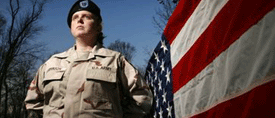WVSS conducted a local survey looking at characteristics of 164 women who were homeless or near-homeless over the past two years. The data included women vets whom WVSS has worked with over the past two years, and well as input from local agencies. The below data should not be considered statistically accurate, is a good representation of the demographics of the population we serve.
Based on this sample, we expect the overwhelming majority of our clients to come from the lower socio-economic population and the use of the services has the opportunity to give them profound benefits. It is important to point out that though our organization is unique in its commitment to female veterans, we never turn down a veteran that we can help regardless of sex.
North Carolina ranks as the state with the sixth largest population (3.7%) of female veterans, with 66,916 as of September 2008. 7609 of these are said to live in Durham, Wake, and Orange Counties (i.e., what is considered the “Triangle area” of North Carolina).
 WVSS serves these three Counties. According the VA’s 2009 Estimate of Homeless Veterans in the VISN 6 / Durham Regional VA medical Center Catchment area, which covers our served population. There are 450 homeless veterans here. Our own survey indicated a slightly higher figure. For example we know that here are uncounted homeless veterans living in the wooded areas in and around the cities of Raleigh, Durham and Chapel Hill. Our volunteers have spoken with them.
WVSS serves these three Counties. According the VA’s 2009 Estimate of Homeless Veterans in the VISN 6 / Durham Regional VA medical Center Catchment area, which covers our served population. There are 450 homeless veterans here. Our own survey indicated a slightly higher figure. For example we know that here are uncounted homeless veterans living in the wooded areas in and around the cities of Raleigh, Durham and Chapel Hill. Our volunteers have spoken with them.
In another report, also from the US Department of Veterans Affairs, 6500 (5%) of the 130,000 homeless vets on any given night are women. The bottom line is that nearly 500 homeless veterans of both sexes living in our area.
Young women service members are homeless at a rate that is increasingly growing. Mostly through attrition jobs have left NC. Many have fled states and come to NC only to find the bleak outlook that there are no jobs.
“Women veterans are one of the fastest-growing segments of the homeless veteran population,” says John Driscoll, who heads the National Coalition for Homeless Veterans. Female veterans are twice as likely to become homeless as women who never served in the military, the government’s latest data show.

